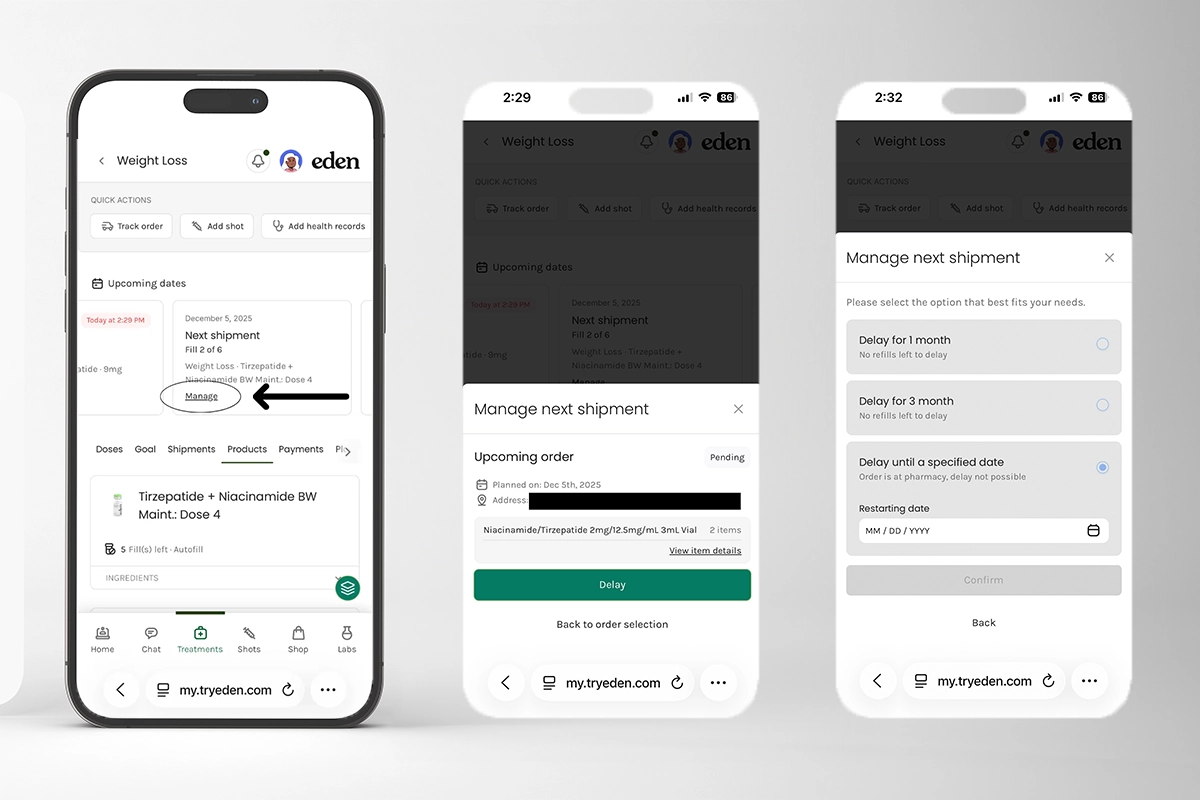How Long Does It Take Semaglutide to Suppress Appetite?
Curious how long it takes semaglutide to suppress appetite? Learn what to expect during treatment and how to support the process with lifestyle strategies.
- Appetite suppression usually starts within 2 to 4 weeks.
- Effects build progressively with weekly dose increases.
- Changes in hunger and portion size may be seen by 12 to 14 weeks.
- Lifestyle changes like hydration, mindfulness, and nutrition may enhance outcomes.
Semaglutide is a GLP-1 receptor agonist that may be prescribed for weight management and type 2 diabetes. One of its most prominent effects is appetite suppression, which may help patients eat less by feeling full sooner and longer.
But how long does it take semaglutide to suppress appetite? Clinical evidence and patient experiences suggest it typically begins within the first few weeks, with full effects appearing after 3 months or more of dose escalation and consistent use.
This guide breaks down what to expect during semaglutide therapy and how to maximize appetite-related benefits with lifestyle strategies.
How Semaglutide Suppresses Appetite
Semaglutide mimics GLP-1, a gut hormone that acts on multiple systems:
- Delays gastric emptying
- Stimulates satiety centers in the brain
- Reduces cravings and reward-based eating
- Promotes insulin while suppressing glucagon to stabilize blood sugar
These effects reduce overall food intake and support long-term weight and metabolic balance. According to clinical trial data, semaglutide's appetite suppression is a primary driver behind its notable weight loss outcomes¹.
The clinical trial results discussed in this summary were based specifically on FDA-approved formulations of semaglutide (such as Wegovy®). Always consult a licensed healthcare provider regarding the appropriate use of FDA-approved medications.
When Does Appetite Suppression Begin?
Semaglutide starts affecting GLP-1 pathways shortly after the first dose, but noticeable appetite changes may emerge around weeks 2 to 4.
Timeline of Effects:
In the STEP 1–4 trials, satiety effects were dose-dependent and closely mirrored the gradual titration schedule of semaglutide over 16–20 weeks ¹.
{{primary-cta}}
How to Support Appetite Suppression
1. Practice Mindful Eating
- Eat slowly
- Recognize fullness cues
- Limit distractions like TV or mobile devices
2. Stay Hydrated
- Drink water throughout the day
- Helps manage early side effects like nausea
- Supports digestion and appetite regulation
3. Prioritize Nutrient-Dense Meals
- Lean proteins (e.g., chicken, fish, tofu)
- Fiber-rich foods (e.g., vegetables, whole grains)
- Healthy fats (e.g., nuts, olive oil, avocado)
4. Avoid High-Fat, Heavy Meals
These can trigger nausea and delay adaptation in the early weeks of therapy.
Why You Might Feel Tired Early On
Semaglutide-induced appetite suppression may lead to reduced calorie intake, especially early in treatment. This can cause:
- Mild fatigue
- Dizziness
- Low energy
These effects typically resolve within 2–3 weeks as your body adjusts. If fatigue persists, discuss adjusting your dosage with your provider.
What If Appetite Suppression Is Too Intense?
In rare cases, semaglutide may over-suppress appetite, making it hard to consume essential nutrients. This can lead to:
- Nutritional deficiencies
- Excess fatigue
- GI distress
If this occurs:
- Speak with your provider about dose modifications
- Opt for small, frequent, nutrient-dense meals
- Use protein shakes or calorie-rich smoothies as needed
Long-Term Appetite Effects
Over time, most patients on semaglutide establish a new normal for hunger and satiety:
- Fewer cravings
- Smaller meals
- Less emotional or stress eating
The STEP trial data show these appetite patterns can persist well beyond treatment when combined with behavioral support ¹
Who Should Not Use Semaglutide?
Avoid semaglutide if you have:
- Personal/family history of medullary thyroid carcinoma
- Multiple endocrine neoplasia syndrome type 2 (MEN2)
- Past pancreatitis
- Pregnancy or breastfeeding
Consult a licensed provider for a full evaluation before starting.
{{primary-cta}}
How Eden Supports GLP-1 Treatment
Eden makes it easier to access medically appropriate GLP-1 therapy, including semaglutide. Our services include:
- Online visits with licensed providers
- Treatment plans based on assessment with independent, licensed providers
- Transparent pricing
- Ongoing support for dosing, symptoms, and nutrition
Final Thoughts
So, how long does it take semaglutide to suppress appetite? For most users, appetite suppression starts within 2–4 weeks, with the full effects becoming clear by weeks 12–14, based on real-world experiences and clinical trials like the STEP program ¹.
With provider support and lifestyle alignment, semaglutide can help reshape hunger patterns and support healthier, sustainable eating behaviors.
Disclaimer: The FDA does not approve compounded medications for safety, quality, or manufacturing. Prescriptions and a medical evaluation are required for certain products. The information provided on this blog is for general informational purposes only. It is not intended as a substitute for professional advice from a qualified healthcare professional and should not be relied upon as personal health advice. The information contained in this blog is not meant to diagnose, treat, cure, or prevent any disease. Readers are advised to consult with a qualified healthcare professional for any medical concerns, including side effects. Use of this blog's information is at your own risk. The blog owner is not responsible for any adverse effects or consequences resulting from the use of any suggestions or information provided in this blog.
Eden is not a medical provider. Eden connects individuals with independent licensed healthcare providers who independently evaluate each patient to determine whether a prescription treatment program is appropriate. All prescriptions are written at the sole discretion of the licensed provider. Medications are filled by state-licensed pharmacies. Please consult a licensed healthcare provider before making any medical decisions.
Frequently asked questions
Typically within 2 to 4 weeks; full suppression builds by 12–14 weeks.
No. Safe dose titration prevents nausea and ensures sustained benefits.
Lower calorie intake can cause early fatigue. It's temporary for most users.
No strict rules, but high-protein, fiber-rich meals work best.
Habits often persist post-treatment, especially with behavioral guidance.
Blog Components



References
Friedrichsen, M., Breitschaft, A., Tadayon, S., Wizert, A., & Skovgaard, D. (2021). The effect of semaglutide 2.4 mg once weekly on energy intake, appetite, control of eating, and gastric emptying in adults with obesity. Diabetes, Obesity and Metabolism, 23(3), 754–762. https://doi.org/10.1111/DOM.14280
The wellness insight you need, without the noise.




















